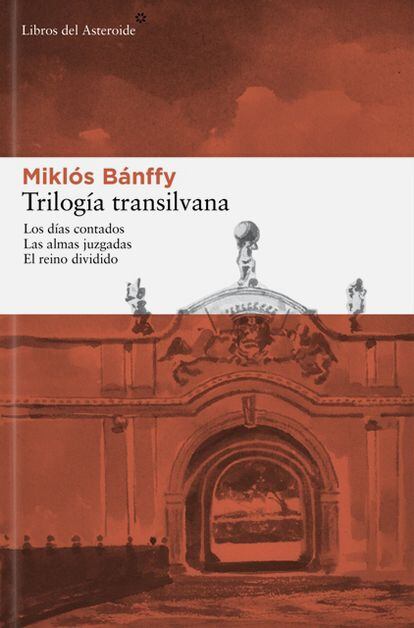A few weeks ago, Viktor Orbán exhibited a scarf with the Greater Hungary map during a friendly match against Greece.
The provocation sowed misgivings among the neighbors, countries and regions that until World War I were part of that crumbled empire on the map and in the cemeteries from the territorial ambitions that were unleashed.
Romania and Ukraine protested against Orbán's gesture.
Like them, Slovakia, Serbia, Austria, Croatia, Slovenia and Poland today make up areas that were part of Hungary and, therefore, important minorities.
More information
Re-read 'Life and Destiny' with the war in Ukraine in the background
Orbán justified himself by alluding to the football game and tried to hide it, but we had all seen it.
His exhibition was just another sign of the Hungarian nationalism that he revives and that he empathizes with that practiced by Putin in Russia, so aggressive and dangerous.
And it was not an isolated thing.
Before he had shared similar images and approved policies that recover the idea of the old Hungary.
Cover of 'Transilvana Trilogy', by Miklós Bánffy.
The nationalist impulse that revives Hungary connects with one of those works that —like Chaves Nogales in the Spanish Civil War and so many others that have taken decades to reach a wide audience— emerge today with enormous force.
It is the
Transylvanian Trilogy,
by Miklós Bánffy, recovered in Spanish by Libros del Asteroid and which continues to beat strongly as the continent slides down the same precipices.
A century ago the last Austro-Hungarian emperor died, that of a regime that settled in two languages and two Parliaments and in which multiple minorities coexisted among too many disparate intentions, too many games and ambitions, which Bánffy intertwines around the life of a young count and reformist politician, Bálint Abády, the love of his life and his gambling cousin, whom we will accompany during the three long books.
That centenary, the war in Ukraine and Orbán's movements are two excuses as valid as any other to recover, with the eyes of this 21st century and at a time when the stability of the continent is shaken, one of the great historical disasters that has occurred. lived in Europe: the collapse of an empire, of a country,
Viktor Orbán wears a scarf with the map of Greater Hungary, in an image spread on his social networks.
The
Transylvanian Trilogy
by Miklós Bánffy (1873-1950) is one of those works that returns decades later to find a recognition that he could not enjoy due to the war, the fractures, the censorship and the victory of the bad guys.
Necessary reading in times of war in Europe, when Putin's Russia tries to bite into Ukraine as a prelude to its claim to the former Soviet space.
Bánffy himself personalizes the fate of his country: born in the city of Kolozsvár, then Hungarian and now Romanian Cluj-Napoca, he was an intellectual and foreign minister of his country who was trapped in his native Transylvania after World War II. World War, under the Soviet sphere.
He managed to escape in 1947 from Romania to Hungary, where he was reunited with his family.
But his books continued to be censored by the communist regimes and only came back to light in the eighties.
Thereafter came recognition that only continues to grow.
"Enjoying a long period of peace, nobody believed in the danger of war," says the text, in one of those phrases that can find so much echo today.
In the first of the three books,
The Numbered Days
(written in 1934), great hunts, aristocratic balls, artists' dreams, duels, races, banquets, luxury, gambling, and frivolity dominate a society. who believes himself immune to the dangers of war and death.
The young Bálint has opening plans in his region and everything seems to smile at everyone.
The discrepancies are still settled in Parliament and Emperor Franz Joseph is only challenged behind the scenes.
In the second,
The judged souls
(1937), all the superpowers of the time are moving while the elites of the Austro-Hungarian Empire, alienated, look at each other, settle their issues and face each other without thinking much about their citizens.
The world moves on while they entertain themselves.
Danger lurks within and without.
And in the third, The
Divided Kingdom
(1940), disaster strikes Bálint, his love, and the country, which implodes unknowingly, so self-absorbed that it celebrates war as the prelude to a new era of conquest and empowerment. .
“Long live the war!” Hungarians shout to celebrate that it has finally broken out and that they are getting ready to fulfill their dreams.
Its cry is that of Russia today, as it was that of Germany, Yugoslavia or, further away but always interconnected, Sudan these days.
Like Stefan Zweig in
Yesterday's World,
Miklós Bánffy wrote it down.
An instruction map of everything not to do.
And what will we do again?
Subscribe to continue reading
Read without limits
Keep reading
I'm already a subscriber



/cloudfront-eu-central-1.images.arcpublishing.com/prisa/FNKUWF5HMBCL7OE2PKC53LFWHU.jpg)



